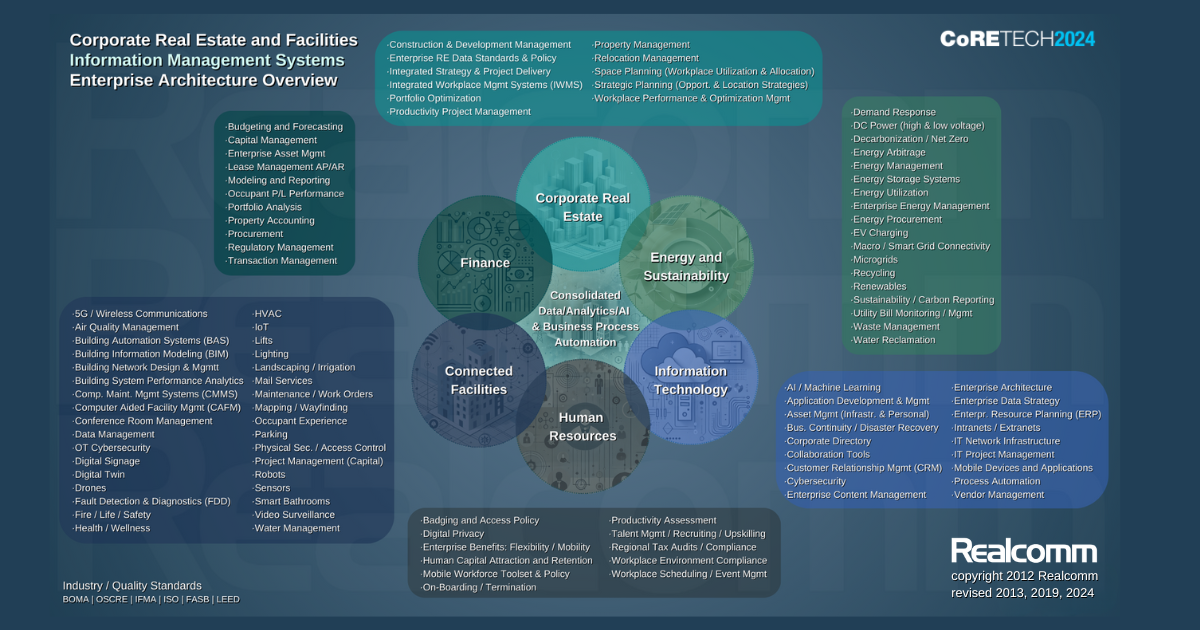Updated Enterprise Architecture Overview for Corporate Real Estate and Facilities: Are We Still Treading Water or Making Progress?

Realcomm has released an updated version of its Corporate Real Estate and Facilities Information Management Systems Enterprise Architecture Overview infographic. This update, while introducing some new elements, closely aligns with the original version released in 2012, underscoring the fact that many organizations have yet to fully realize a comprehensive approach to corporate real estate (CRE) and facilities information management.
The updated infographic reflects the state of technology and integration within the CRE and facilities space, with many core elements from the 2012 framework still remaining relevant today. This continued alignment with the original vision points to a reality where, despite incremental innovations, the broader adoption of fully integrated enterprise architecture remains elusive for much of the industry.
Key aspects of the updated infographic include:
- A consistent focus on fundamental CRE and facilities systems, highlighting the enduring need to identify and manage the multitude of information touchpoints within corporate real estate.
- The persistence of cross-departmental integration challenges, where departments such as IT, HR, Finance, and Facilities still struggle to collaborate on CRE and facilities processes and data management.
- The growing importance of data-driven decision-making, supported by advanced analytics, AI, and automation – but only partially realized by most organizations.
“While there have been significant technological advances in mobility, smart buildings, and data analytics, many corporate real estate organizations have yet to implement a truly comprehensive information management system,” said Jim Young, Co-Founder and CEO of Realcomm. “The fact that so many elements from our original infographic remain relevant today speaks to the slow adoption of these strategies, even though the potential benefits for integrated and automated workflows are more critical than ever.”
Limited Progress in Comprehensive Integration: The updated infographic, featuring Consolidated Data, Analytics, and Business Process Automation at its core, reaffirms the opportunity for greater collaboration between departments such as Corporate Real Estate, Connected Facilities, Energy and Sustainability, IT, Finance, and Human Resources. However, despite the evolution of technologies over the past decade, very few organizations have achieved the seamless integration outlined in the original framework. Disparate systems, siloed data, and under-utilization of automation tools continue to hinder the industry.
A Call to Action: Realcomm continues to advocate for more proactive strategies in the adoption of integrated, data-centric methodologies for managing corporate real estate and facilities. The roadmap established more than a decade ago remains as relevant as ever, and organizations that take the steps to align their systems and data workflows stand to gain significant operational efficiencies, cost savings, and improved decision-making.
The updated infographic (view here) will be presented and debated at CoRE Tech 2024, scheduled for November 19-20, 2024, in San Jose. CoRE Tech remains the leading conference for corporate real estate and facilities professionals focusing on the intersection of technology, automation, and innovation.
This Week’s Sponsor
Pointr is the leader in digital maps and location technology for the workplace. Pointr’s technology revolutionizes the workplace with AI mapping and smart building capabilities. With more than 7 billion SF digitized to date, Pointr unlocks seamless digital mapping experiences in over 5,000 buildings, across 35 countries for 14 Fortune 100 companies.
Read Next
 5/15/2025
5/15/2025
Tech, Talent and Transformation: 2025 Digie Finalists Announced For 27 years, Realcomm has presented the Digie Awards to acknowledge companies, real estate projects, technologies, and individuals that have advanced the commercial real estate industry through the strategic use of technology, automation, and innovation.
 5/15/2025
5/15/2025
Empowering Space Management with Data-Driven Visualization For effective CRE space management, it’s critical to centralize lease data, maximize rental square footage (RSF), improve energy efficiency and reconfigure spaces to meet changing needs.
 5/8/2025
5/8/2025
The AI-Powered Workplace Evolution: Redefining the Business Landscape In today's rapidly evolving business environment, the fusion of Artificial Intelligence (AI) and Workplace Management is revolutionizing the way organizations approach workspace optimization and operational efficiency.
 3/27/2025
3/27/2025
The Convergence of Edge Computing, Cloud, and AI in Building Automation and Smart Buildings In the built environment, we have seen the convergence of Operational Technology (OT) and Information Technology (IT), later expanding to include Workplace Technologies (WP).







%20(1)%20(1)%20(1).png)



